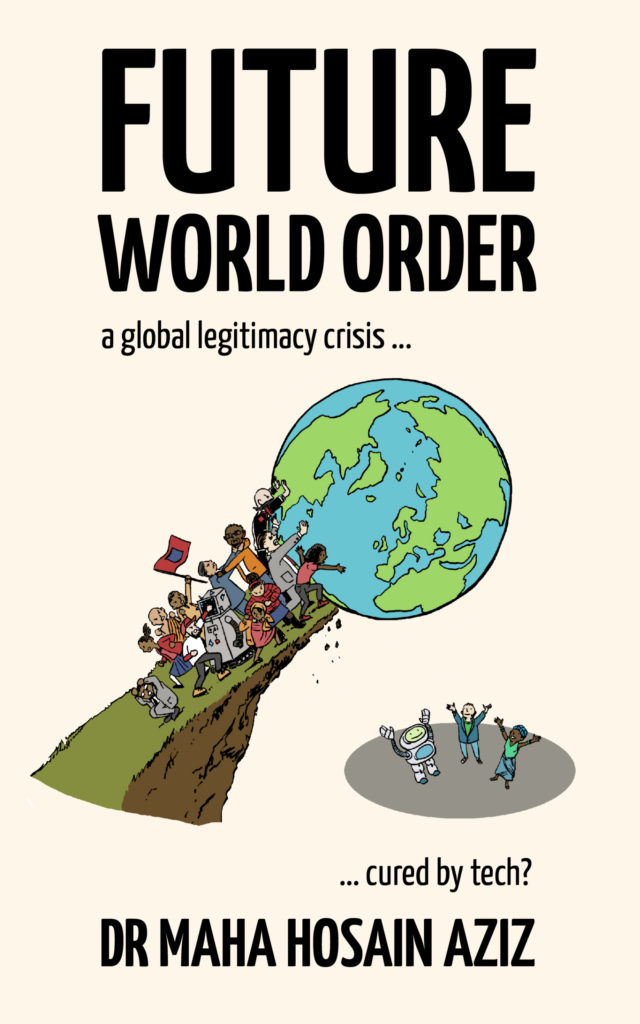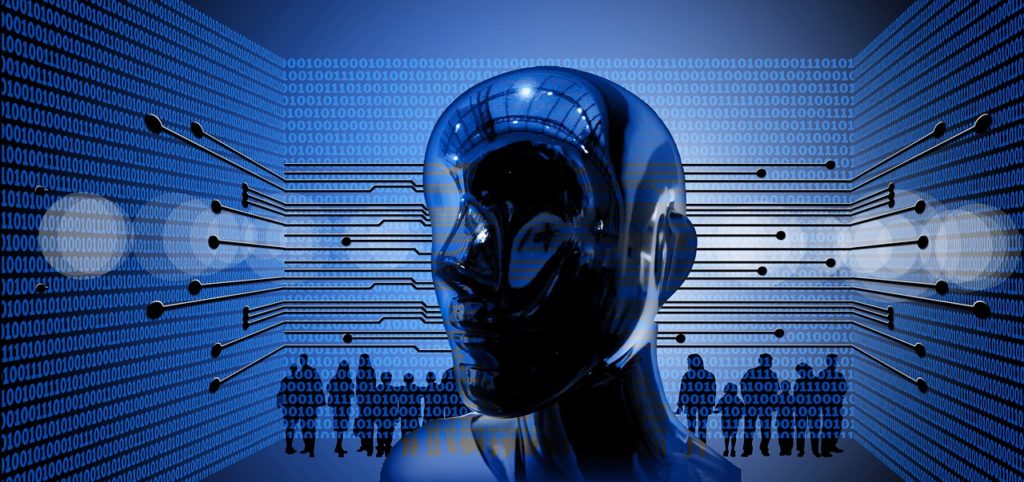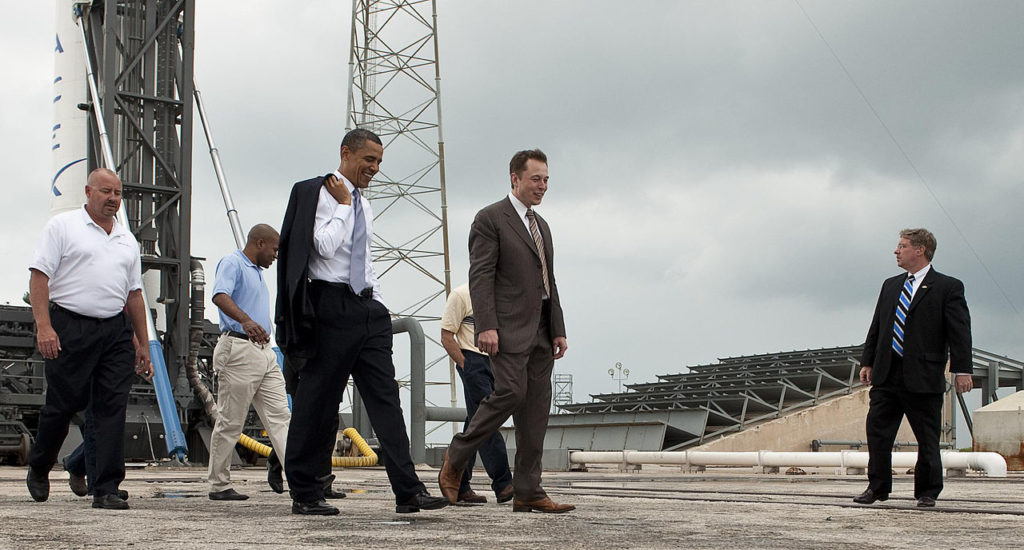Maha Hosain Aziz is a professor, author and cartoonist specializing in global risk and prediction in the MA International Relations Program at NYU’s Graduate School of Arts & Sciences, New York. She is a visiting fellow at the London School of Economics’ Institute of Global Affairs, also blogging and consulting on her specialty. Her new book, Future World Order, was launched in spring 2019 at London’s new social justice club, The Conduit. Public intellectuals termed it a ‘must-read’ (Dr Ian Bremmer, Kishore Mahbubani) penned by a ‘global thinker to watch’ (Dr Nouriel Roubini) and an ‘engaged scholar activist’ (Dr Parag Khanna). Besides speaking engagements on her book at venues globally, she has done several podcasts, radio and video interviews and has most recently also been reviewed in the Pakistani media. Future World Order is available as a paperback and e-book on Amazon globally. Almost 15 percent of profits from the book are going to Maha’s late brother’s memorial fund, the Abid Aziz Fund, which supports a charity – the Peace & Sport’s Syrian Refugee Youth Project in Jordan’s Za’atari camp. Her first book The Global Kid (2016) – a political comic book which she drew for the youth – is also available on Amazon (all profits to charity). It won five awards globally and is being adapted into a political graphic novel for adults. Maha previously taught South Asian Politics at the University of London’s SOAS and dabbled in both investment banking and media. She is a Jordanian-born Pakistani who grew up in the Middle East (Jordan, Saudi Arabia), Southeast Asia (Singapore, Malaysia), Europe (UK, Greece) and the US. And she is a social scientist trained at Brown (BA), Columbia (MA) and the LSE (MSc, PhD).
What is your new book Future World Order about?
Future World Order is my vision for the world today – and how things will likely unfold in the coming years. Like many others, I was perplexed by US President Donald Trump’s victory in the 2016 election and the Brexit vote results in the UK that same year. But, in reflecting on my academic work as an NYU professor and consulting work with governments and corporates since 2012, I realised that globally there was much more happening than just these two shock events. There were similar threats to stability – what I term ‘risks’ in our ‘global legitimacy crisis’ – building in most parts of the world which persist today.
We are faced with some major questions with no clear answers: If it is not a US-led world anymore, who’s in charge of the international system? If democracy is weakening, is there a better system to replace it? If globalisation is failing, is populism the answer? If liberal values are in decline, will xenophobia dominate?
This is a very sensitive global turning point and my book aims to serve as a guide for all audiences – from the silent generation to post-millennials — to make better sense of the world. I also consider how tech has made this crisis worse but ultimately may have to be the cure.

From your book, I see a deep concern about the collapse of global values like human rights and democracy in what you call the post-hegemonic world. Why do you say that?
We have to remember that after the Cold War, the US effectively earned the legitimacy to lead the international community and promote certain values like democracy and human rights. These were seen as ‘global’ values that we were all, in theory, supposed to subscribe to. That is no longer the case, as Trump has repeatedly said it is not his responsibility to “represent the globe” or tell other countries what to believe.
So, who is filling that gap?
Some have argued that German Chancellor Angela Merkel is now leading the free world, while others highlight the role of France and even China in promoting certain values. I argue that we will not have any clarity on this anytime soon, which is a problem and adds to the world’s instability.
We are faced with some major questions with no clear answers: If it is not a US-led world anymore, who’s in charge of the international system? If democracy is weakening, is there a better system to replace it? If globalisation is failing, is populism the answer? If liberal values are in decline, will xenophobia dominate?
However, the issue is more than just not knowing ‘who’ is promoting global values like democracy; the larger issue is whether democracy is even still desired by citizens?
Many studies suggest that Western youth don’t care about democracy anymore as compared with previous generations. And if you look globally, the reality is there has been a challenge to the political status quo in most democracies and non-democracies in recent years from Brazil to South Korea and certain EU countries. Citizens armed with tech are challenging their governments in an unprecedented fashion. This has left many speculating as to whether democracy is the best political system, as was declared after the Cold War. Or is there something better? Again, the lack of clarity on the very legitimacy of our political system is itself a threat to our stability.
What is the new world order – who’s in charge?
It’s unclear. We know the geopolitical status quo of US hegemony has shifted and that’s why I label the world currently as ‘post-hegemonic’. Even if the US is still in some ways setting the tone in geopolitics, no one can deny Trump’s unilateral rhetoric emphasising how the US is not responsible for the world anymore. Nor can we ignore China’s repeated declarations of its global ambition; France’s growing influence via soft power; Russia’s dominant hybrid warfare; and so on. The international system appears to be headed in a more multipolar direction, after 25 years of US hegemony post-Cold War. Others, like author Dr Parag Khanna, argue that the future is Asian, while some studies illustrate that the future is African with one in five people being African by 2030.
However, it may be time to reevaluate what we mean by power today. A superpower traditionally is defined by its superior position globally in terms of its economy, diplomacy, culture and, of course, military. Yet, military strength is changing – it’s no longer just about conventional weapons or even nuclear weapons. Like with many issues today, it boils down to tech. In my book, Future World Order, I consider how tech is changing the very nature of power, especially military power — and will likely determine the next leading superpower.

The consensus among superpowers Russia, US and China seems to be that Artificial Intelligence (AI) will be key to their national security in the future. In fact, AI could revolutionise military power — and war — as much as nuclear arms have done, according to a 2017 Harvard report. So who will win the new AI weapons race?
It may be prudent to have a group of tech leaders, technologists and citizens get together in a G7-like setting to define this new social contract — that deepening relationship between tech companies and citizens. There is uncertainty from possible wars to terrorist attacks and more climate change disasters, but perhaps with a social contract we can at least try to get a handle on how tech will — or should — shape our lives?
Russian President Vladimir Putin has openly said that the country with the best AI will “become the ruler” of the world. This may be why his country has already publicly declared it will build ‘killer robots’ no matter what. China has plans to dominate all types of AI by 2030 including weaponry to beat out competition from the current leader – the US. Clearly, tech is going to be the game-changer in securing power in the international system. We will need to recognise this shift in the nature of power to truly understand the new world order.
Are there new power players in what you say is a post-hegemonic world?
Yes, indeed. We have to recognise the rise of non-state actors, beyond the traditional civil society. They are the relatively new influencers in our post-hegemonic world, in part a response to governments suffering from declining legitimacy. In recent years, we have witnessed the power of the citizen protester, bringing down some dictatorships in the Middle East and North Africa (MENA) region, challenging austerity policies in certain EU countries and ousting seemingly corrupt leaders in countries like South Korea and Brazil. Such citizen power has also gone beyond domestic problems, becoming more globally united against Trump’s rhetoric on issues like women’s rights, immigration and climate change. Such activism has, of course, been facilitated by the social media – a reminder of how tech companies are also a key non-state influencer in our post-hegemonic world, perhaps more powerful at times in shaping society than governments.
Related to that, we cannot ignore the rise of the activist billionaire. Today’s activist billionaire is spotting trends and sharing his views publicly more than ever. Many of these billionaires are techies and are seeing it as their responsibility to remind us of the negative impact technology will have on society, including more unemployment.
For instance, as Alibaba’s Jack Ma put it, “In the coming 30 years, the world’s pain will be much more than happiness.” This has sparked a recurring policy debate among activist billionaires about how universal basic income (UBI) might help us cope with tech-related unemployment in the coming years. Slack’s Stewart Butterfield suggests “giving people even a very small safety net would unlock a huge amount of entrepreneurialism”. Virgin’s Richard Branson takes the policy suggestion one step further – AI will wipe out jobs but will create extreme wealth that can be reinvested in part in UBI.

Other activist billionaires are also putting their money where their mouth is. Think of UBI – Y Combinator’s Sam Altman decided to take the ongoing debate between activist billionaires to the next level with a pilot project to see what might work. In climate change, Michael Bloomberg pledged $15 million of his own money to the UN and has also facilitated “a new coalition of cities, businesses and universities” to take a lead role in fighting this global challenge. Other billionaires, led by Gates, have put their funds into a $1 billion venture fund for clean energy tech to fight climate change. And, more recently, Tesla’s Elon Musk offered to rebuild Puerto Rico with his solar power battery packs, after Hurricane Maria (and Trump’s tweets that aid cannot continue “forever”).
Collectively, these non-state actors – the citizen protester, tech company and the activist billionaire – are more aggressively shaping the post-hegemonic world – because, once again, they can and perhaps need to, due to a US with less global vision.
You give a lot of importance to technology and its ability to bring in some moral order in a fast-changing society. Is it because of improved accounting softwares and blockchain to prevent petty corruption or is there more to it?
Great question! We all know tech has some serious downsides — for instance, it is being used by extremists and xenophobic citizens to promote hate globally. This is obviously a problem and the debate will continue on how to regulate social media. But, there is the potential to use tech for good. Can we use tech to create a counter-narrative to hate that can challenge extremists and xenophobes globally?
As you say, blockchain can help reduce corruption and that is already being tested. In Mexico, blockchain is being developed by the government to track bids for public contracts. In India, Andra Pradesh is the first state to use blockchain to manage land records in a country where apparently over 65 per cent of civil cases are property-related. In Kenya and Nigeria, local startups are also exploring how blockchain could reduce corruption in land ownership. And so on.
Alibaba’s Jack Ma put it, “In the coming 30 years, the world’s pain will be much more than happiness.” This has sparked a recurring policy debate among activist billionaires about how universal basic income (UBI) might help us cope with tech-related unemployment in the coming years. Slack’s Stewart Butterfield suggests “giving people even a very small safety net would unlock a huge amount of entrepreneurialism”.
Most countries are struggling with major legitimacy crises where the gap, or the distrust, between citizens and governments is growing. Reducing corruption through blockchain, is one way to use tech for good.

It may be time to consider some kind of guidelines or even a social contract involving tech, as I argue in my book. Whether we like it or not, tech companies’ influence on our lives is growing every day. Governments, especially in the US and Europe, will keep calling for some kind of regulation, just as certain think- tanks and commentators will keep calling for more consideration of the ethics of such tech. This is necessary and important.
For the moment, there is still no clarity about what we as citizens really expect from tech companies, despite their notable impact on our lives. It may be prudent to have a group of tech leaders, technologists and citizens get together in a G7-like setting to define this new social contract — that deepening relationship between tech companies and citizens. There is much uncertainty ahead that we may not be fully prepared for, from possible wars to terrorist attacks and more climate change disasters, but perhaps with a social contract we can at least try to get a handle on how tech will — or should — shape our lives?
AlibabaBusinessChinaGlobal Economyglobal powerRussiaTechnologyTeslaUS